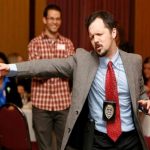April 2003
Dear Readers,
Between the time this issue of Vital Source was created and actual press time, America entered into war with Iraq. This is one of the disadvantages of being a monthly publication, and our lack of coverage of the war and its implications, for April anyway, cannot be helped. For May, I would love to share reader letters and short essays on the war, especially from people whose lives are directly touched. Please send all correspondence to editor@vitalmilwaukee.com, or by mail to the address in the staff column.
The war is being televised, and things are happening quickly. While I feel confident we’ll never fail to support our troops again (a la Vietnam), there are underpinnings to this particular conflict that, if unchecked, will bring fundamental changes to our democracy.
In an increasingly technological world, access to information is the key to power. But the stripping of personal freedom and overt censorship are not the answers. Individual liberty, access to due process, and innocent until proven guilty are the cornerstones of our Constitution. Fundamentally, we as a nation agree on two key points: we want our men and women home quickly, and a swift end to the war. But we must take care that, in our zeal to “end oppression” in the Middle East, we do not eliminate oppression’s most powerful natural enemy – a nation of free peoples – our nation, the United States of America, and the democracy for which it stands.
A perfect snapshot of our confusion occurred on Oscar Night. Michael Moore, in his acceptance speech for Best Documentary, was met with a mix of boos and cheers (boos were later mostly attributed to Teamster crew members) when he said (speaking on behalf of himself and others present onstage): “… we live in fictitious times. We live in a time when we have fictitious election results that elect a fictitious president… We live in a time where we have a man sending us to war for fictitious reasons, whether it’s the fictition (sic) of duct tape or the fictition (sic) of orange alerts, we are against this war, Mr. Bush.” All Oscar winners are technically given 45 seconds to speak from the stage. At precisely 45 seconds, Moore’s microphone was cut mid-sentence and the orchestra began to play. Conversely, Richard Martin’s acceptance speech for Chicago ran well over a two minutes, but contained no political references. He was not cut off. And even though Adrian Brody mentioned the war in his four minute accectpance speech, he only went so far as to wish a speedy end to the conflict and to express his support of the troops. Brody was also not censored. This may seem a small event, but all who watched the Oscars witnessed censorship first hand.
A Vital celebration
This month brings a major benchmark for Vital. We are celebrating our one year anniversary under our current name. Some of you may remember Vital’s first incarnation – Virus/Infectious Information. After two issues last year, we changed our name and the magazine has been evolving ever since. Because we’ve all been working very hard and because there’s never a bad time to revel with friends, we’re having a big party at Onopa Brewery on Saturday, April 26th. Please check out our full page ad in the front of the issue for all the details. It promises to be a great time, and all proceeds from the event benefit WMSE, Frontier Radio 91.7 fm. And because we believe, in true hobbit style that it is better to give gifts than to receive them on one’s birthday, we’ll have lots of cool prizes to give away at the party, including a trip for two to Las Vegas.
Rites of Spring
With Spring upon us, the thoughts of many turn to baseball. Regardless of your upbringing, few have been completely untouched by the sport, whether it be a day at a Major League park, swinging a bat in rec leagues, or cheering on your favorite youngster from splintered wooden stands in the little leagues. John Hughes shares his own vision of the passion of America’s Pastime. He takes Vital readers on a tour of Milwaukee’s “other” baseball history as well as the Independent Leagues, where the old spirit of the game still thrives.
Two other stories address an under-represented group especially close to my heart – teens – and the issues they face as they make that most challenging of transitions, from childhood to the “adult” world. Erin Stalnaker contributes the story of the two Elizabeths; immigrants who, by virtue of their birth, will have a very difficult time, under current Wisconsin law, pursuing higher education, despite their honor roll status and generous contributions to their community. In a special Vital Lives, we’ve spoken with five very different teens who are determined to find their own way in the vastly complex world they’re preparing to enter. They are all wonderful, and this story gives hope to us all.
Thanks again for picking up Vital Source this month.



















